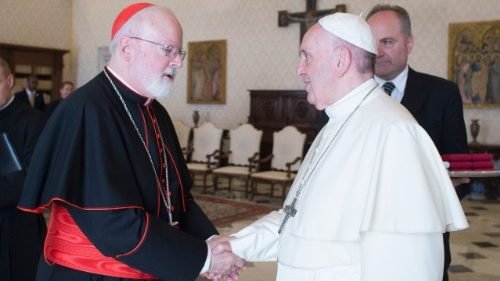Taking their cue from Pope Francis, the Pontifical Commission for the Protection of Minors, during their tenth Plenary Meeting, focuses on learning, listening, assisting, and protecting victims of clerical sexual abuse. At the conclusion of the Meeting, the Commission published the following press release:
By the Pontifical Commission for the Protection of Minors
“The best results and the most effective resolution that we can offer to the victims, to the People of Holy Mother Church and to the entire world, are the commitment to personal and collective conversion, the humility of learning, listening, assisting and protecting the most vulnerable.” Pope Francis, February 24, 2019
Listening and Learning
The 10th ordinary Plenary Assembly of the Pontifical Commission for the Protection of Minors began in Rome Thursday April 4, with the testimony of a mother from sub-Saharan Africa, who was the victim of clerical sexual abuse as a child.
This testimony was part of the Commission’s ongoing commitment to root all endeavors in attentive listening to the lived reality of those who have suffered abuse in the Church.
Commission members would like to thank her for her enduring witness and for the insight she provided into the complex issues that victims/survivors of clerical sexual abuse face in her specific cultural context.
Assisting and Protecting
Opening the April 4-7 Assembly, Commission President, Cardinal Séan Patrick O’Malley, O.F.M. Cap. greeted members on behalf of the Holy Father.
He also conveyed Pope Francis’ appreciation for the Commission’s assistance in initially proposing both the February Meeting with Presidents of Bishops Conferences on the Protection of Minors and the recently published safeguarding guidelines and norms for Vatican City State, the Vicariate for Vatican City and the Roman Curia.
Feedback from the February meeting indicates that the understanding of the critical role of safeguarding in the life and mission of the Church is maturing. It also indicates that much remains to be done.
In light of this and its specific mandate to advise the Holy Father and through him assist the local Church leadership, the Commission is pursuing a large number of projects including:
• Through its group Working with Survivors, the establishment of a Virtual Survivor’s Advisory Panel (SAP). This method of listening to, and learning from survivors in a safe and culturally familiar space, is in addition to those local SAPs already established and at various stages of development within the local Church in Brazil, Zambia and the Philippines.
• An internal study day with international experts regarding understanding sexual offending and its implications for preventing future abuse. This understanding is a key factor in proactively providing safe environments for minors.
• A substantial project on creating an audit instrument. This includes the compilation of a collection of materials on safeguarding guidelines and the analysis of models for monitoring the level of implementation with the aim of creating a resource to assist local churches in the creation, implementation, review and audit of safeguarding programmes.
• Research to assess the status of implementation of safeguarding education and formation in Catholic schools, beginning with pilot projects in South Africa, Colombia, India, the Philippines and Tonga.
Conferences
• An international academic seminar on issues relating to “Confidentiality and Transparency” with particular emphasis on canonical penal procedures, planned for December 2019.
• A “Latin American Symposium on Protective Environments in Churches and Civil Societies” co-hosted by the PCPM and the Archdiocese of Bogotá, with the participation of the Confederation of Latin American and the Caribbean of men and women Religious (CLAR), the Latin American Episcopal Council (CELAM), Catholic Schools, government entities, international and local NGOs, international media, and Churches of other denominations.
The Holy See
The working groups of the PCPM have also continued their dialogue with Congregations and dicasteries of the Roman Curia which have particular responsibilities in the area of safeguarding, including the Doctrine of the Faith, for Laity, Family and Life, Institutes of Consecrated Life and Apostolic Life, Clergy, and Bishops.
The Commission would also like to thank H.E Archbishop Charles J. Scicluna of Malta for sharing his time and expertise with members during the Plenary Assembly.
The 10th ordinary plenary assembly of the Pontifical Commission for the Protection of Minors took place in Rome April 4 to 7, 2019.
The Pontifical Commission for the Protection of Minors was created by Pope Francis in March of 2014 to propose the most opportune initiatives for the protection of all minors and vulnerable adults and to promote local responsibility in the particular Churches.



